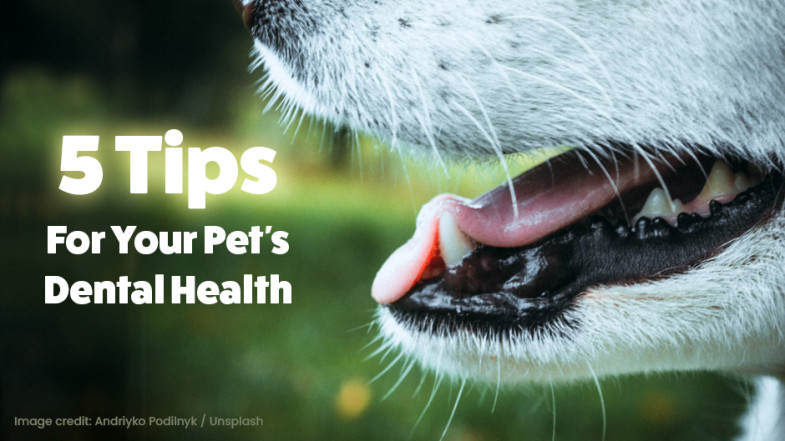Turner Veterinary Clinic News
5 Tips for Your Pet's Dental Health

We all wish for our furry friends to live happy, healthy lives by our sides. But often overlooked in pet care is a critical area that affects their overall well-being: dental health. Just like us, pets' teeth need regular attention to prevent discomfort, disease, and systemic health issues. In this article, we'll provide you with five essential tips to give your pet the sparkling, healthy smile they deserve!
The Benefits of a Healthy Smile
The twinkle in your pet's eye is often matched by the joy in their smile. But beneath the surface, dental issues in pets can lead to pain, infection, and even heart or kidney problems. Being proactive with dental health can add years of wiggly, wet-nosed companionship to your pet's life.
Tip 1: Regular Brushing
Dental brushing is the gold standard for pet oral health. With a little patience and the right method, you can make it an enjoyable part of your pet's routine.
- Technique: Start slow with just a finger to get them used to the sensation. Gradually introduce a pet toothbrush and toothpaste formulated for pets. Never use human toothpaste to brush your pet's teeth.
- Frequency: Aim for a daily brushing session. Consistency is key to keeping teeth and gums in top condition.
- Tools: Soft-bristled brushes and enzymatic toothpaste made for pets are gentle options designed for delicate pet mouths.
Tip 2: Appropriate Dental Diet
What your pet eats significantly impacts their dental health. Choose their meals wisely to support strong teeth and gums.
- Dry Kibble: The crunch of kibble can be a good mild abrasive, helping to clean teeth as your pet chews.
- Special Formulas: Some pet foods are engineered with dental health in mind, designed to decrease plaque and tartar buildup. We can help provide suggestions which take into consideration your pet's age, lifestyle and overall health needs.
Tip 3: Chew Toys and Dental Treats
Chew toys and specially designed treats can be your pet's best buddies in the battle against plaque.
- Chew Toys: Tough rubber, nylon, or rawhide chews can provide a satisfying and tooth-scraping experience for your pet.
- Treats: Dental treats can be a tasty, effective way to reduce plaque and tartar.
Ask us about the safest options for chews and treats that will provide benefits to your pet’s dental health.
Tip 4: Professional Dental Cleanings
Despite your best efforts, some dental issues require professional intervention.
- Importance: Regular visits to a veterinary dentist ensure that both routine cleaning and potential issues are addressed promptly.
- Frequency: Your vet is the best person to advise on how often your pet needs professional dental care. Typically we recommend professional dental cleanings one time per year.
- Anesthesia: While it can be a concern, modern techniques have made it very safe for sedating your pet for thorough dental cleaning. This allows us to identify dental disease below the gumline and develop a comprehensive treatment plan specific to your pet.
Tip 5: Monitoring Oral Health
Knowing the signs of dental issues can help you catch and treat problems early.
- Visual Checks: Regularly inspect your pet's teeth and gums. Look for signs of bleeding, bad breath, or swelling.
- Behavioral Clues: Changes in eating habits or excessive drooling can signal dental discomfort, prompting a closer examination.
- Regular Veterinary Visits: Your vet visit isn't complete without a quick oral examination. Don't hesitate to raise any dental concerns you might have, and reach out to us to schedule an appointment.
Your Pet's Smile is Your Mission
Your pet's dental care is a partnership between you and your trusted veterinarian. Implementing these key tips will not only enhance your pet's quality of life but also save you from potential veterinary expenses in the future. Remember, their well-being is in your hands, from choosing the right dental diet to detecting early signs of trouble. So, scoop up that toothbrush and let’s give your pet the megawatt smile they were born to flaunt!
Categories
Recent Posts

February is often associated with love, thanks to Valentine’s Day, and that makes it a perfect time to show extra care to the pets who mean so much to us. While treats and cuddles are always appreciated, one of the most meaningful ways to support your pet is by focusing on their health from the inside out. Dental health and heart health may seem like separate topics, but they are closely connected and both play a major role in your pet’s overall wellness.

When was the last time your pet saw the veterinarian for a checkup, not because they were sick, but just to stay healthy? Preventive care is one of the most important ways to give your pet a longer, happier life. It’s not about doing one big thing. It’s about the small, consistent steps that help avoid bigger health problems later on.

The holidays are full of sparkle, laughter, travel, and to-do lists a mile long. As joyful as this season can be, it often means busier schedules and less time for everyday routines. In the middle of the holiday rush, it's easy to overlook one very important family member: your pet.

If you're lucky enough to have a senior pet, you know just how special that bond becomes over time. From cozy afternoons on the couch to the look in their eyes that says, "I've known you forever," there’s a deep and quiet understanding between you. As pets get older, though, their needs change. Aging isn’t a disease, but it does require us to adapt how we care for our beloved companions.
The good news? With the right care and attention, senior pets can enjoy happy, healthy golden years. Here are seven simple but meaningful health tips to help your older dog or cat feel their best.

Has your dog seemed a little more reserved lately, or is your cat less interested in playing with their favorite toys? It can be easy to attribute these changes to aging or mood, but pets are experts at hiding discomfort. The good news is that there are plenty of subtle signals that can provide clues that your pet may be experiencing pain, and many treatment options to help alleviate this discomfort.